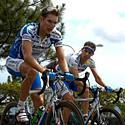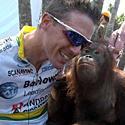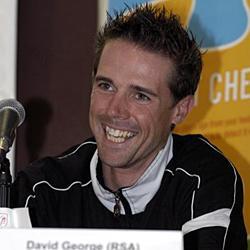
Recently on Cyclingnews.com |
An interview with David George, February 10, 2005
Cultural differences and personal reinvention
After a less than satisfying year, Barloworld's David George wants to get back to the basics, and become the rider he believes he was destined to be when he first turned professional. As the team prepares itself for its season in Europe, Shane Stokes speaks with a man dealing with cultural differences and personal reinvention.
Despite being just 28 years of age, David George is one of the most experienced South African racing cyclists. Back in 1997 he finished third in the under 23 world championship time trial and then repeated the podium position the following season in the Commonwealth Games TT. Third place in the 2002 Tour de Langkawi was followed by the first of three consecutive wins in the Giro Del Capo, South Africa's premier stage race. The former US Postal Service rider was also the national road race champion in 2003 and the time trial winner one year later.
That national crown, his third Giro Del Capo win and sixth in the Tour de Langkawi would seem to mark out last season as a good one, but George says he was disappointed with his year. "I think you have good years and bad years," he says. "For me personally it was a disappointing year, for various reasons. Physically... I fell off twice at the start of the year and never gave my body enough time to recover from it. I spent the whole year nursing a back injury and being frustrated that I wasn't getting the results that I wanted to get. But hopefully we have solved the problem."
That frustration boiled over into a falling out with the Team Barloworld management last year and the news that he would not be riding with the team in 2005. However, things were smoothed over and he is now back firmly in the fold; indeed, if his relaxed, satisfied demeanour at the recent training camp is anything to go by, he seems to be in good spirits and looking forward to the year ahead. He sees 2005 as an opportunity to step up the level of his performances and to learn from the established European professionals now riding as part of the Team Barloworld-Valsir squad.
Cyclingnews: What have you been up to before this camp?
David George: Well, we just flew over from South Africa. I have been doing normal pre-season training back home but this year has been a bit different for us, because we have a bigger programme in Europe this year. So obviously we are limited to the number of races that we will be doing back home. In the past we had to start with a reasonable programme back home, but we are not doing that this year as we are more committed to a European programme.

|
CN: Have you noticed a difference in the feel of the team?
DG: Yes, between last year and the year before was big, but this difference this year is bigger again. I think it has always been John's [Robertson, team manager-Ed] objective to take a team to the Tour de France. I suppose it is the race that most of the English-speaking countries recognise as being the race to ride. That has always been the objective; it is a pretty big objective to have, but as long as you are committed to achieving that, then that is fine.
CN: What is your condition like compared to other years?
DG: At this stage of the season, I think I have held back a bit compared to other years. Previously, I have been raring to go for Malaysia (Tour de Langkawi)... it has always been my initial goal for the year, but this year I will be taking it a little bit slower. I will perhaps be trying to get used to the cold weather a little bit sooner. Previously, we'd spend the full pre-season in South Africa and then go straight to Malaysia. We'd then head back to South Africa and come here in March. Your body is really at its peak, but then you have to get used to riding in the cold, which is pretty hard.
CN: So you have been deliberately holding back?
DG: Well, not holding back as such. We worked really hard in the pre-season but the training we have been doing has been geared towards being good a little later on. It has just been a little easier, not being flat-out on the first of February. That is the biggest difference for me this year, to hold back a bit so I can be good for some of the more traditional races in Europe this year.
Having said that, it has always been important in the past for South-African based teams to be recognised there. Now that we have achieved that and Barloworld as a sponsor have recognised the value of what we are doing, it has kind of enabled us to leave that aside a little bit and look to Europe.
"To go to races and get your head kicked in is one thing, but to go to races and to have a purpose, whether it is for him or for one of us to win, that gives us a whole different perspective on things.- George on the added motivation that Igor Astarloa brings to Barloworld |
CN: Will the team do many races in South Africa this season?
DG: I think the interest in cycling in South Africa is phenomenal, it gets bigger and bigger every year. But the biggest thing for the country is a race like the Tour de France. I think once Barloworld as a sponsor and South Africa as a country get to know what we do in races here in Europe, the more we will be able to participate in events away from South Africa. It should enable us to do some more traditional races.
CN: Is there any indication yet as to what the team's programme will be?
DG: You will have to ask the directeur sportif (John Robertson) what his intentions are in South Africa, but I think the major objectives are the national championships in March and the Giro Del Capo, which is our biggest stage race. And there are one or two races at the end of the year. But there is a big gap in between, which is the traditional European season.
CN: Looking back, what were the highlights of your 2004 season?
DG: You know, I think you have good years and bad years. For me personally, it was a disappointing year, for various reasons. Physically... I fell off twice at the start of the year and never gave my body enough time to recover from it. I spent the whole year nursing a back injury and being frustrated that I wasn't getting the results that I wanted to get. But hopefully we have solved the problem.
CN: How did you go about rectifying that?

|
DG: At the end of the day, if an injury is lurking around, there is only one way to get rid of it. As riders we don't like to take a big chunk of time off during the season, but that is what was necessary. So having a bit of time out and opportunity to be at home and get the proper rehabilitation, that allowed me to recover from that.
CN: So now there is a new look team, with different riders and a generally expanded setup. Will having a rider of the calibre of Igor Astarloa make a big difference to the team?
DG: I think it is certainly going to change the dynamic, in that we are a group of youngish riders and it will definitely give us more of a purpose. It will give us the freedom to shine where we need to shine, to support someone and have some kind of purpose in races...
CN: Presumably having a name like that is going to be a gateway to big races?
DG: Sure. And also, to go to races and get your head kicked in is one thing, but to go to races and to have a purpose, whether it is for him or for one of us to win, that gives us a whole different perspective on things.
CN: There are twenty-five riders and ten different nationalities in the 2005 line-up. Being here on the camp, it is clear that there are a few different languages flying around. How is the communication within the team?
DG: There is always a big challenge in any team, particularly because the cross cultures are bigger. The difference between a Frenchman and an Italian and a Spaniard... there are differences but they all have a similar culture. But there is a bigger difference when you look at someone from Europe and someone from South Africa or Australia. So it is challenging. Possibly the biggest challenge for us as South Africans coming over to Europe is that culture gap. But now having a group of us with a structure that respects who we are is going to give us an opportunity to shine and also to show more tolerance for the (European) culture and to understand it better.
CN: What do you find is the biggest difference regarding culture?
DG: I just think understanding the difference and managing the culture difference rather than just writing someone off. Being tolerant to being different in culture and different in approach. Understanding why we approach something differently and have a different mentality to someone who has a different perspective on life. Because we all have different cultures... even in South Africa, just amongst us we have got English, we have got Afrikaans, we have got multicultural. So I guess just an understanding of each other's culture and a willingness to understand someone else's culture is the challenge.
CN: You and the rest of the team are going to be spending a lot of time here in Europe. You will have a nomadic thing going on, travelling around to races. You have had that in the past but it is going to be an even bigger factor now... would you consider that a strength of yours, and is that one of the things about the job which appeals to you?
DG: Yeah, I think it is. And obviously being in a group of guys that something in common helps. When we go home you have got guys who are mates. We are a very close group, the South Africans, and so when you go home you have someone to chat to. Each guy's wife or girlfriend is around too, and so it is a little bit easier than being isolated, travelling around Europe on your own. Anyway, it is part of the job and we only do that for a few years.
CN: What is the recognition of the sport like in South Africa?
DG: It is surprisingly good. There is a huge following for cycling and an even bigger following for the Tour de France. South African cycling culture is quite unique because a lot of it is based around our fun ride system, events like the Argus Cycling Tour. It (South African cycling) caters for a real broad spectrum - everybody from eight to much, much older can compete in their own age category, at the same race as the pros. So it is quite a unique cycling culture.
But it is big and people do watch the Tour de France, which gives huge scope for a South African-based team aiming to take part.
CN: I guess there will be a knock-on effect if the team shine in races over in Europe, with more SA guys wanting to try it out...
DG: Sure, sure. I suppose it is going to take time to bring the young guys through, to give them the mentality to become a pro bike rider. But it wasn't an opportunity ten years ago, you had to come over and bash it out on your own, whereas now at least there is the infrastructure to bring talented guys through.
CN: Do you have goals set out for the 2005 season?
DG: I think it is difficult to set out goals right now because we don't know the full programme, but from a personal point of view I want to reinvent myself. I want to get back to basics as a bike rider, to the things I was good at when I turned pro. Obviously, I will support the big riders who have come to the team and try to learn from them. I will play a strong supporting role and hopefully get the opportunity to shine at what I am good at.
CN: What would you consider your strengths?
DG: Time trialling has always been a passion of mine but I have never been allowed to shine at that. So I think I would like to reinvent myself this year and work on that. And obviously just working on a few victories, it is time now to start winning race... stages in stage races or one day races, there is definitely scope for that this year.
CN: Where has the increased ambition come from - is it a natural evolution for the team or has it been generated by the arrival of Igor Astarloa and other riders like that?
DG: I think it is a natural progression in terms of confidence and realising what your capabilities are, and also having a structure which helps you race. As you know, some of the best cyclists don't win races, so there needs to be a structure to support you to be the kind of rider that you are. So I think that is also the reason for us to have real objectives.
CN: You are 28 now, so you have four or five good years ahead of you. What would you like to achieve in that time?
DG: I definitely would like to be part of a South African team which races the Giro d'Italia this year and the Tour de France in a year or two. And obviously not just to be at those races, but to be a factor in those races, in whatever way. Things have changed so fast for us as a team. Obviously you need to have something that you dream of and the ultimate goal is to do something in the Tour.
CN: It must be a very exciting time with things progressing so fast. You are on the verge of doing some big, big races. That must add a lot to the morale of the team?
DG: It does! To see the progression and also to be able to take guys like Astarloa onto the team... it shows we have moved up a notch or two and have been accepted into cycling culture as well. We are not just seen as a hacker team, but as a serious operation. The goal now is to build further on that...

